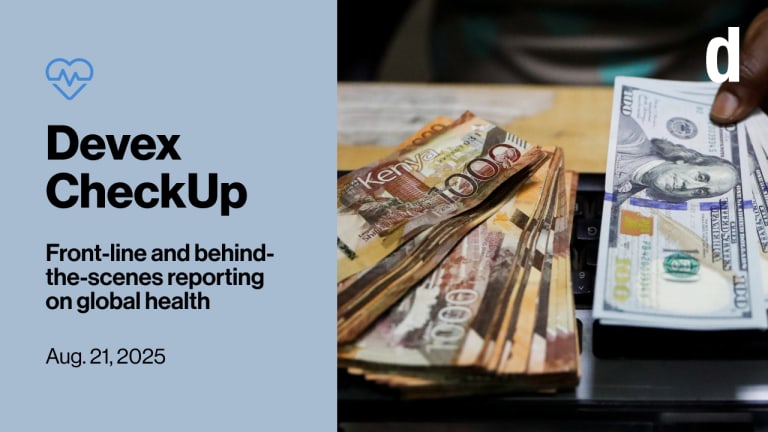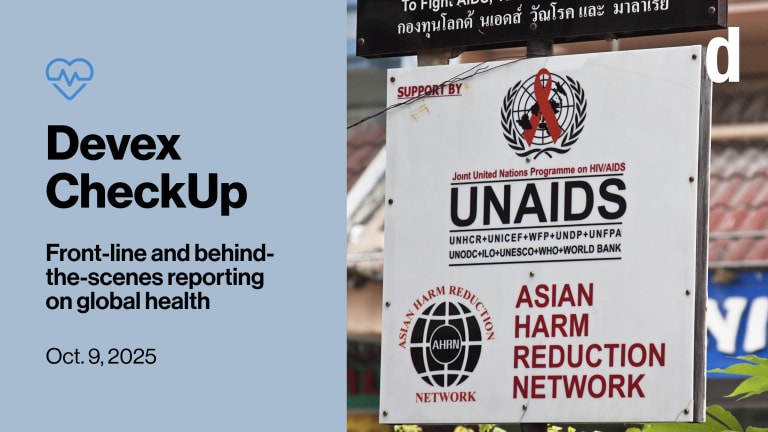
Last month, WHO’s decision not to declare the current monkeypox outbreak a public health emergency of international concern, or PHEIC, took many experts by surprise.
This is a preview of Devex CheckUp
Sign up to this newsletter for exclusive global health news and insider insights, in your inbox every Thursday.
The nature of the outbreak is unusual: The virus is spreading in countries where it has not been reported before, and many cases don’t have known links to regions where the disease is endemic. But the International Health Regulations emergency committee advising WHO’s director-general said it needed more data to determine a PHEIC.
Still, experts argue that declaring a PHEIC would have sparked off the international cooperation needed to respond to the outbreak.
• At the core of the issue is the limited and vague nature of the IHR criteria for making the decision. Instead of a range of options, an outbreak can only be declared a PHEIC or not. And while it must be an “extraordinary event,” what that means is not exactly clear. “The binary nature of the PHEIC system under the IHR is an obstacle to a more rational and clear risk assessment of events that don’t necessarily check all the boxes,” says Gian Luca Burci, an adjunct professor at the Graduate Institute of International and Development Studies in Geneva.
• Debates around PHEIC announcements are not new. In January 2020, WHO initially opted not to declare COVID-19 a PHEIC but then changed its mind a week later — a delay later called out by the Independent Panel for Pandemic Preparedness and Response.
• “I would rather the [IHR emergency committee] overreacted than under-reacted. It is better to err on the side of decisive action,” Lawrence Gostin, a professor at Georgetown University, tells Jenny. Gostin believes the emergency committee should have recommended the declaration of a PHEIC to help prevent the outbreak from spreading among high-risk groups.
• A U.S. proposal for targeted amendments to the IHR includes a provision that allows WHO’s director-general to issue an intermediate public health alert when an event does not fall under the PHEIC criteria. But a final discussion on amendments is not expected before 2024.
• As for monkeypox, WHO Director-General Tedros Adhanom Ghebreyesus said this week that he plans to reconvene the emergency committee in the week of July 18 or potentially earlier to determine whether the outbreak constitutes a PHEIC based on the latest available data.
Read: What is a public health emergency? Monkeypox outbreak raises questions
Ask the experts
Your next job?
Technical Officer, Health Emergencies Surveillance
World Health Organization
Brazil
Can local manufacturing solve equity and access issues when it comes to vaccines? That’s the question Amruta and our colleague Sara Jerving will be asking Dr. Amadou Sall, general administrator of the Institut Pasteur de Dakar next week at Devex World. Have any other questions for Dr. Sall? Or for Dr. John Nkengasong, Deborah Birx, or Richard Hatchett? Let us know at checkup@devex.com.
Join us at Devex World in person or online. You can also register for our free livestream of events.
Countdown to Impact
On Monday, the global health unit of French pharmaceutical giant Sanofi announced a new brand and fund to support its goal of bringing 30 essential medicines to 40 lower-income countries.
The brand, called Impact, will carry medicines for diseases such as malaria, tuberculosis, and diabetes. But medicines aren’t enough, says Jon Fairest, who leads the global health unit. Many countries have weak health infrastructure, and the company would need to invest in educating patients and health care professionals to make a real difference. “There's no point in selling a batch of insulins into a country,” he says, “[if] no one knows how to use it or how to manage the patient effectively.”
Read: Why Sanofi is investing in health care ecosystems (Pro)
+ Devex Pro members can also read about a new biotech company focused on developing COVID-19 treatments. Not gone Pro yet? Start your 15-day free trial.
One big number
$250 billion
—That’s how much funding is needed to end tuberculosis by 2030, according to a new global plan launched by the Stop TB Partnership on Wednesday.
But whether that money will be raised is another question entirely. TB is a chronically underfunded disease: In 2018, United Nations member states committed to raising $13 billion per year by 2022 to fight TB — but in 2020, global spending for TB totaled just $5.3 billion.
Read: $250B plan to end TB seeks new vaccine by 2025
Equal access
“A lot of things are being declared but not being done for us. … A lot of problems aren't solved.”
— Vitaly Pcholkin, the head of a Ukrainian NGO for people with disabilitiesPcholkin has been lobbying Ukraine’s government since 2014 — when Russia annexed Crimea and armed separatists in the Donbas region — to create accessible bomb shelters and increase medical assistance. But he tells Sam Mednick, reporting for Devex, that authorities have made only empty promises to help, leaving few protections for Ukrainians with disabilities amid the current crisis.
Read: People with disabilities left behind during the war in Ukraine
+ ICYMI we have a visual story on the struggles of Ukrainian farmers to cultivate their fields or export harvests. Plus, if you haven't yet, sign up to Devex Dish, our free, must read newsletter on the global food system.
What we’re reading
ACT-Accelerator, the WHO program for ensuring equitable access to COVID-19 products such as vaccines, is set to wind down in its current form this fall. [Politico]
Crisis-hit Sri Lanka’s hospitals are “completely dependent on donations.” [BBC]
Acute hunger leads to severe health risks in the Horn of Africa. [VOA]










